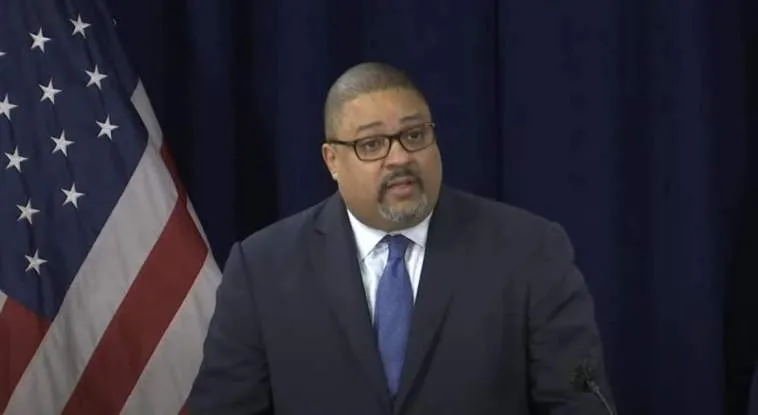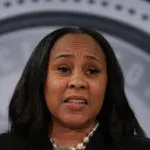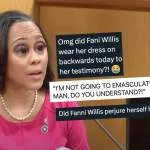(Washington Examiner) Former President Donald Trump will head back to New York on Thursday for a hearing in his criminal hush money case, which was once viewed as the weakest of four indictments he faces but could now be the first to head to trial next month.
Trump was indicted in late March 2023 over an alleged “catch-and-kill” scheme during the 2016 presidential campaign to create false business records to conceal an alleged affair with porn star Stormy Daniels. Justice Juan Merchan, who has a history of overseeing Trump-related cases, is tasked with deciding whether to move forward with the scheduled March 25 trial start, whether to postpone the trial, or whether to throw out the case as he considers five key arguments Trump’s defense lawyers plan to make.
 Donald Trump and Alvin Bragg. | AP
Donald Trump and Alvin Bragg. | AP
Since Trump’s April arraignment over the 34-count indictment, some legal observers have suggested the indictment could be the most toothless of the four he faces for several reasons, including that judges rarely ever sentence first-time offenders to any time behind bars for the crime of felony falsification of business records.
In the months after the initial indictment, “people were just saying, ‘Oh, this is a weak case,’” former federal prosecutor Shanlon Wu said during a Wednesday call with reporters in response to the Washington Examiner’s questions.
“There’s this question about the legal theory, that question about legal theory — we’re really not at that point anymore. It’s gonna be a question of proving the case,” Wu said.
In the months following Manhattan District Attorney Alvin Bragg’s indictment, two major developments occurred: Merchan declined Trump’s request for him to step aside from the case and rejected his bid to move the case from state court to federal court.
Meanwhile, Trump’s attorneys plan to accuse Bragg of reviving a “zombie case” to interfere with the Republican front-runner’s efforts to regain the Oval Office in the 2024 presidential election. Bragg’s predecessor, Cyrus Vance Jr., declined to pursue an indictment over the same allegations in this case.

The indictment centers on allegations that Trump falsified business records at the Trump Organization in order to influence the 2016 election illegally by arranging payments that amounted to $130,000 to silence claims possibly harmful to his candidacy. It includes 34 counts of distorting records related to checks Trump sent to Michael Cohen, his former lawyer and problem-solver, to reimburse Cohen in order to conceal tax crimes and hide the true nature of the payments.
Here are the five arguments Trump’s lawyers are likely to present in an effort to prove that Bragg’s case should be shut down.
Undue delay and statute of limitations
Trump’s defense team, led by seasoned attorneys Todd Blanche and Susan Necheles, plans to argue the Manhattan District Attorney’s Office waited more than six years to file charges after Daniels made public allegations about the extramarital affair. They have argued in part that Trump has been “prejudiced by the delay.” They also contend that the prosecution in the case is “time-barred” and that the district attorney’s office must “prove beyond reasonable doubt that the statute of limitations was otherwise inapplicable,” according to the 57-page motion.
The investigation began in 2018, and no indictment was returned until March 2023.
Bragg’s office is likely to argue that the governor’s COVID-19 executive orders extended the statute of limitations for the criminal charges, and it might argue that Trump’s time as president from 2017 to early 2021 stopped the clock on the statute of limitations.
Trump’s lawyers argued the executive orders were “ambiguous” and, therefore, should not be interpreted as having paused the statute of limitations against Trump.
Objections to linking hush money payments to federal election
Blanche and Necheles say former Special Assistant District Attorney Mark Pomerantz and his colleagues found that even if the hush money payments were made to help then-candidate Trump in 2016, such falsifications would have been “only a misdemeanor under New York law” and cannot be tied to the alleged effort to help out his presidential campaign.
Prosecutors say Trump’s charges count as felonies because Trump had intent to commit election law violations and deceive tax authorities. The argument applies an untested theory to the former president, and Merchan will have to decide whether it will be presented to the jury.
Pomerantz created the “zombie case” because of how many times his team “abandoned the theory, only to revive it when other inquiries were even less fruitful,” Trump lawyers wrote in their motion.
Former Assistant U.S. Attorney Andrew Weissmann told the Washington Examiner he suspects that there’s a decent chance the state is going to win on a “bump up” of what would typically be a misdemeanor charge to a felony, noting that it is not uncommon for prosecutors to do so when an alleged crime may have an “additional intent.”
“As long as there is that additional intent that makes it a more serious offense, that is a completely rational basis on which the state can act,” Weissmann said.
Multiplicitous counts should be nixed
The indictment charges one count for each of the 11 false invoices, 12 false ledger entries, and 11 false checks. Trump’s attorneys argue this is wrong on several points, including that it is a violation of the Sixth Amendment and “creates the risk that a defendant will be punished for, or stigmatized with a conviction of, more crimes than he actually committed.”






